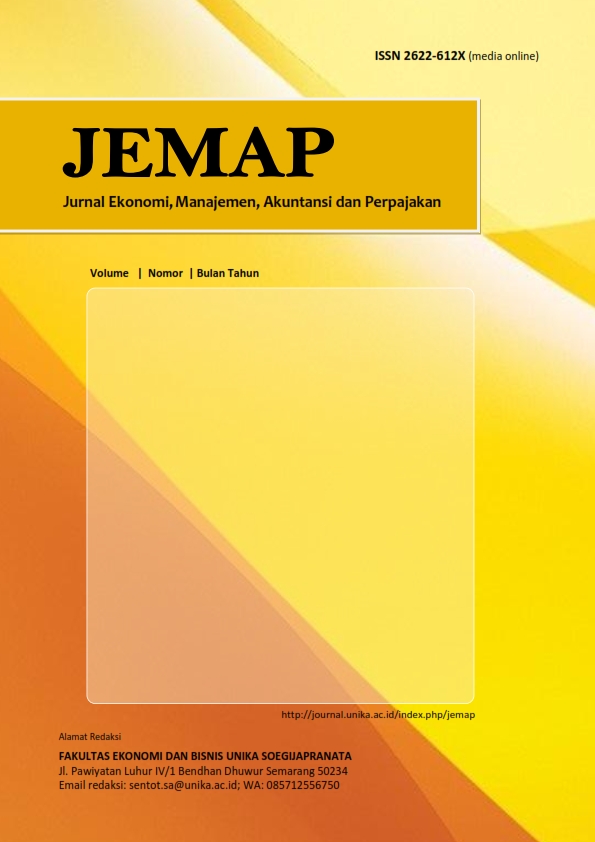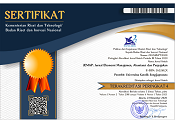Membangun Komitmen Di Atas Kepemimpinan dan Trust
Abstract
Tujuan dari penelitian ini adalah untuk memperoleh informasi bahwa terdapat pengaruh langsung positif kepemimpinan dan kepercayaan terhadap komitmen organisasi. Dengan pendekatan kuantitatif penelitian ini menggunakan metode survei dengan wawancara terstruktur dengan sampel 75 guru. Data yang terkumpul diolah dengan analisis jalur. Hasil penelitian menunjukkan bahwa (1) komitmen organisasi dipengaruhi secara langsung positif oleh kepemimpinan dan kepercayaan. Kesimpulannya adalah komitmen organisasi dapat dibangun diatas kepemimpinan yang baik dan kepercayaan yang tinggi. Jadi disarankan jika kita ingin mendapatkan komitmen organisasi yang tinggi, kita harus meningkatkan kepemimpinan dan kepercayaan.
Keywords
Full Text:
PDF (Bahasa Indonesia)References
Avolio, B. J., Zhu, W., Koh, W., & Bhatia, P. 2004. Transformational Leadership and Organizational Commitment: Mediating Role of Psychological Empowerment and Moderating role of Structural Distance. Journal of Organizational Behavior, 25 (8), 951–968.
Bedeian, A. G., & Glueck, W. F. 1983. Management. Tokyo: Dryden Press.
Canessa, E., & Riolo, R. L. 2003. The Effect of Organizational Communication Media on Organizational Culture and Performance: An Agent-Based Simulation Model. Computational & Mathematical Organization Theory, 9 (2), 147-176.
Colquitt, J. A., LePine, J. A., & Wesson, M. J. 2011. Organizational Behavior: Improving Performance and Commitment in the Workplace. New York: McGraw-Hill.
Daft, Richard L., and Mac Dorothy. 2003. Management: The New Workplace. Ohio: Thomson-South-Western.
Davis, Keith, and John W. Newstrom. 2002. Organizational Behavior: Human Behavior at Work. New York: McGraw Hill.
Dharma, Satria. 2009. “Apapun Kurikulumnya, Mutu Guru Kuncinya.” Dari Guru Konvensional Menuju Guru Profesional. Jakarta: Grasindo.
Drafke, Michael. 2009. The Human Side of Organizations. New Jersey: Pearson Prentice Hall.
Franken, R. E. 2009. Human Motivation. California: Brooks Publishing Company.
Fullan, Michael. 2001. The New Meaning of Educational Change. New York: Teachers College Press, Columbia University.
Genetzky-Haugen, M. S. 2010. Determining the Relationship and Influence Organizational Culture has on Organizational Trust. Lincoln: Graduate College at the University of Nebraska.
George, J. M., & Jones, G. R. 2005. Understanding and Managing Organizational Behavior. New Jersey: Prentice Hall.
Gibson, J. L., Ivancevich, J. M., Donnelly, J. H., & Konopaske, R. 2009. Organizations: Behavior, Structure and Process. New York: McGraw-Hill.
Greenberg, J., & Baron, R. A. 1995. Behavior Organizations Understanding & Managing Human Side of Work. New York: Prentice Hall International.
Griffin, R. W. 2002. Management. Boston: Houghton Miffin Company.
Kinicki, A., & Kreitner, R. 2010. Organizational Behavior, Key Concepts, Skills, and Best Practices. New York: McGraw-Hill.
Kursad, Yilmaz. 2008. The Relationship Between Organizational Trust and Organizational Commitment in Turkish Primary Schools. Journal of Applied Sciences, 8 (12), 2293-2299.
Li Lanqing. 2004. Education for 1.3 Billion. Beijing: Pearson Education.
Lok, P., & Crawford, J. 2004. The Effect of Organizational Culture and Leadership Style on Job Satisfaction and Organizational Commitment: A cross-National Comparison. Journal of Management Development, 23 (4), 321 – 338.
Luthans, F. 2005. Organizational Behavior. Singapore: McGraw-Hill.
McCormick, E. J., & Tiffin, J. 2004. Industrial Psychology. New Jersey: Prentice Hall.
McShane, S. L., & Glinow, M. V. 2010. Organizational Behavior. New York: McGraw-Hill.
Mullins, L. 2005. Management and Organizational Behavior. New Jersey: Prentice Hall.
Nelson, D. L., & Quick, J. C. 2006. Organizational Behavior: Foundations, Realities, and Challenges. South-Western College Pub.
Owen, R. G. 1991. Organizational Behavior in Education. Boston: Allyn Bacon.
Robbins, S. P., & Judge, T. A. 2012. Organizational Behavior. New Jersey: Prentice Hall.
Ronald C. Nyhan. 1999. Increasing Affective Organizational Commitment in Public Organizations: The Key Role of Interpersonal Trust. Review of Public Personal Administration, 19 (3), 58.
Ronald W. Perry. 2004. The Relationship of Affective Organizational Commitment with Supervisory Trust. Review of Public Personal Administration, 24 (2), 133.
Scandura, T. A., & Pellegrini, E. K. 2008. Trust and Leader—Member Exchange: A Closer Look at Relational Vulnerability. Journal of Leadership & Organizational Studies, 15 (2), 101-110.
Schemerhorn, J. R. 2000. Managing Organizational Behavior. New York: John Wiley and Sons.
Schermerhorn, J. R., Uhl-Bien, M., & Osborn, R. N. 2011. Organizational Behavior. New Jersey: John Wiley & Sons.
Sherriton, J., & Stern, J. L. 1997. Corporate Culture/Team Culture: Removing the Hidden Barriers to Team Success. New York: AMACOM.
Slocum, J. W., & Hellriegel, D. 2007. Principles of Organizational Behavior. South Western.
Stoner, J. A., Freeman, R. E., & Gilbert, D. R. 1995. Management. New Jersey: Prentice Hall.
Undang-Undang Nomor 14 Tahun 2005 tentang Guru dan Dosen
Walumbwa, F. O., Orwa, B., Wang, P., & Lawler, J. J. 2005. Transformational Leadership, Organizational Commitment, and Job Satisfaction: A Comparative Study of Kenyan and U.S. Financial Firms. Human Resource Development Quarterly, 16 (2), 235–256.
Williams, E. S., Rondeau, K. V., & Francescutti, L. H. 2007. Impact of Culture on Commitment, Satisfaction, and Extra-Role Behaviors among Canadian ER Physicians. Leadership in Health Services, 20 (3), 147-158.
Yilmaz, K. 2008. The Relationship Between Organizational Trust and Organizational Commitment in Turkish Primary Schools. Journal of Applied Sciences, 8 (12), 2293-2299.
Yousef, D. A. 2000. Organizational Commitment: a Mediator of The Relationships of Leadership Behavior with Job Satisfaction and Performance in a Non-Western Country. Journal of Managerial Psychology, 15 (1), 6 – 24.
DOI: https://doi.org/10.24167/jemap.v4i1.3107
Refbacks
- There are currently no refbacks.
e-ISSN 2622-612X | View My Stats







